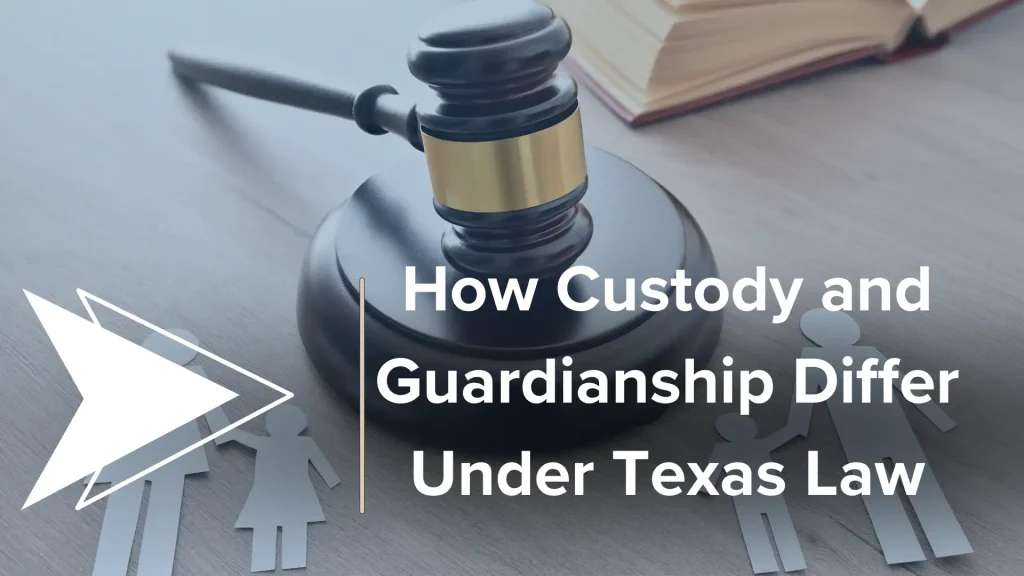
Custody rights in Texas and guardianship differ greatly, despite both involving the legal care of a child. Custody is typically established in a divorce where the couple has children. The guardianship process involves specific responsibilities, depending on whether it is guardianship of a person or estate. A sibling, relative, or family friend may be a guardian. Understanding the difference between guardianship vs custody in Texas is essential, as each comes with different legal rights.
If you are going through a divorce, you may have questions about child custody vs. guardianship. Or you may want to know who can file for custody or guardianship. A skilled and experienced family law attorney will consider your answer to these questions and assist you in your case.
Key Differences Between Custody and Guardianship in Texas
Parental rights and third-party guardianship authority are two issues that arise when differentiating between custody and guardianship. Although custody and guardianship are two legal arrangements for the care of a child, significant differences exist as follows:
- Scope of responsibility – Texas custody laws establish who is responsible for a child’s physical care and who has legal decision-making authority. Guardianship responsibilities may include managing a child’s finances or other legal matters that can arise.
- Relationship to the child – A court generally awards custody to a child’s biological or adoptive parents. However, the child’s grandparents, other relatives, or even close family friends may be given guardianship over the child.
- Reason for the arrangement – A custodial arrangement is often necessary when the child’s parents separate or divorce. A court may order guardianship when the child’s parents cannot fulfill their parental role.
- Duration – A Texas court may order custody until a child is eighteen. In the minor guardianship legal process, guardianship may be temporary or permanent, depending on the unique family circumstances and needs.
When Should You Seek Custody vs. Guardianship?
Guardianship is typically sought if a parent cannot care for a child. This may be because the parent died or is incapacitated. Under these circumstances, a court may appoint a child’s adult sibling, relative, or family friend as guardian. As an appointed guardian, they will make decisions concerning the child’s upbringing and finances, as further discussed below.
Family court custody process orders are typically entered when parents separate or divorce, when a court orders custody, parental rights to make certain decisions for the child are affected, including decisions about the child’s healthcare, education, and religious upbringing.
Legal guardian vs. custodial parent rights and responsibilities greatly differ. If you have questions about your decision-making authority under a custody arrangement or guardianship, a family law lawyer can help. They can explain Guardianship vs. Custody – What’s the Difference, so you fully understand who has legal rights to decide for the child and under what circumstances.
What Types of Guardianships Can Be Established?
In Texas, two types of guardianships exist: guardianship of a person and guardianship of an estate. Guardianship of a person means the guardian provides for the child’s daily needs, including shelter, food, and supervision. As the child’s primary caretaker, the guardian will also make decisions concerning their medical treatment and education.
The duties of an appointed guardian of an estate differ from those of the guardian of the person. For example, they manage property or money the child receives through an inheritance, as insurance proceeds, or from a lawsuit settlement. Although one person can fulfill both roles, the court can appoint two individuals if that will better serve the child.
Please read more about child custody arrangements here: Does Religion Affect Child Custody Arrangements?
What Custody Arrangements Are Available in Texas?
 Child custody is referred to as “conservatorship” in Texas. A court may order any of the following common types of conservatorships, depending on the child’s best interests:
Child custody is referred to as “conservatorship” in Texas. A court may order any of the following common types of conservatorships, depending on the child’s best interests:
- Joint managing conservatorship – In this form of conservatorship, the divorcing spouses share custody of the child. Shared custody doesn’t mean each parent has equal time with the child. However, both have the authority to decide about the child’s medical treatment, education, and religious upbringing. Further, both have equal access to information concerning the child.
- Possessory conservatorship – In a possessory conservatorship, the parent has visitation rights with the child. However, they do not have the decision-making authority of a custodial parent.
- Sole managing conservatorships – A sole managing conservatorship means that one parent has sole legal custody of the child. In other words, one parent is primarily responsible for the child’s care and upbringing.
Contact Adams Law Firm Attorneys & Counselors, PLLC Today
Whether you are involved in a contentious custody dispute or have questions about Texas guardianship laws, contact Adams Law Firm Attorneys & Counselors, PLLC. Our team of experienced family law attorneys in Texas stands by to help. We understand that this may be a challenging time in your life. We want to help you and your family navigate the Texas court system. When you are ready to speak to a lawyer about your case, contact us online or call (281) 391-9237.



